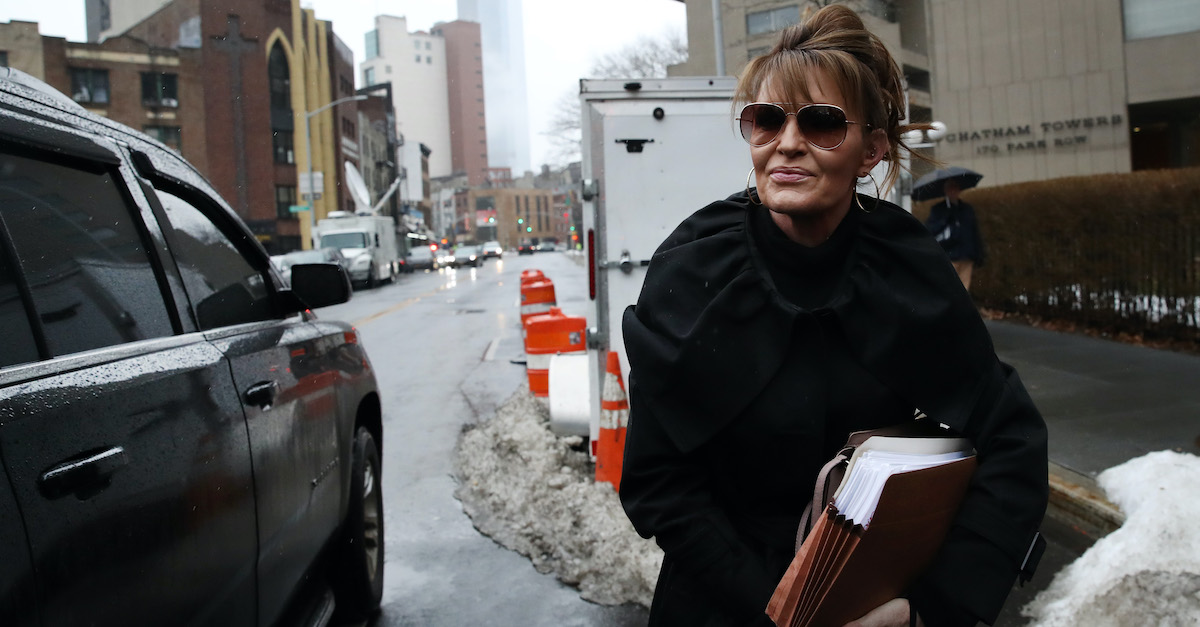
NEW YORK, NEW YORK – FEBRUARY 03: Former Alaska Governor Sarah Palin arrives at a federal court in Manhattan to resume a case against the New York Times after it was postponed because she tested positive for Covid-19 on Feb. 3, 2022 in New York City.
Several of the federal jurors who rejected Sarah Palin’s defamation lawsuit against the New York Times received “push notifications” on their phones informing them that the judge had dismissed the case a day earlier, according to a new court document.
Senior U.S. District Judge Jed Rakoff wrote that the jurors told his clerk that his ruling did not factor into their deliberations.
“Late yesterday, in the course of such an inquiry in this case — in which the jury confirmed that they had fully understood the instructions and had no suggestions regarding jury instructions for future cases — several jurors volunteered to the law clerk that, prior to the rendering of the jury verdict in this case, they had learned of the fact of this Court’s Rule 50 determination on Monday to dismiss the case on legal grounds,” Rakoff wrote in a two-page order on Wednesday.
Legal experts questioned the timing of Rakoff’s ruling on Monday, which found that no reasonable jury could have found actual malice in the Times’s 2017 editorial falsely linking Palin to Jared Lee Loughner’s mass shooting.
The jury agreed a day later that the quickly corrected editorial did not defame the former Alaska governor and one-time GOP vice presidential candidate.
“These jurors reported that although they had been assiduously adhering to the Court’s instruction to avoid media coverage of the trial, they had involuntarily received ‘push notifications’ on their smartphones that contained the bottom-line of the ruling,” the order continued. “The jurors repeatedly assured the Court’s law clerk that these notifications had not affected them in any way or played any role whatever in their deliberations.”
Titled “America’s Lethal Politics,” the 2017 editorial noted that Palin’s political action committee Sarah PAC circulated a map with crosshairs over the electoral district of Arizona Rep. Gabrielle Giffords and 19 other Democrats. The original version went further to claim “the link to political incitement was clear”—an assertion stricken some 12 hours later. That error sparked a nearly five-year-long defamation battle that ended with Palin’s defeat this week.
Experts say Wednesday’s revelation about the jurors could arm her for her inevitable Second Circuit appeal.
Attorney Mitchell Epner, who has consulted with media organizations on First Amendment and copyright issues and is now of counsel with Rottenberg Lipman Rich PC, told Law&Crime that it was predictable in the age of smartphones that Rakoff’s ruling would have seeped into the jury’s consciousness.
What Epner previously called a potential appellate issue, he says could now have teeth.
“I would have expected the judge to wait for the jury to return its verdict before ruling on the motion for judgment as a matter of law, because there was no urgency to issuing that ruling,” Epner previously noted. “Nothing would have changed if he had waited for the verdict to have been announced, or for the jury to say that they couldn’t reach a verdict.”
Jurors are not sequestered during deliberations, except under exceptional circumstances. They regain access to the cell phones when they return home following trial or deliberations.
Read the order, below:
(Photo by Spencer Platt/Getty Images)